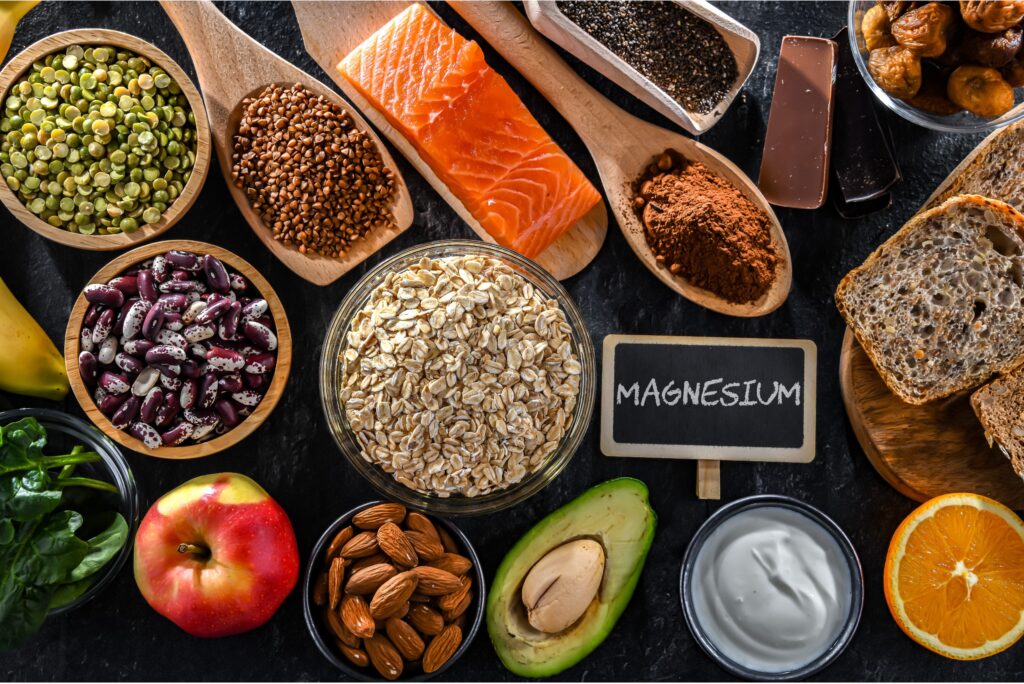By Kathy Abascal
Editor’s Note: Please enjoy this article, reprinted from the January 6, 2011 Vashon Loop and just as relevant today.
Magnesium is an essential mineral. It regulates and helps maintain normal blood pressure. Magnesium also helps regulate our cholesterol levels. Low stores of magnesium increase the risk of abnormal heart rhythms, associated with both heart attacks and strokes.
Magnesium strengthens our bones, and we store almost half of our magnesium in our bones. A diet rich in magnesium prevents the formation of gallstones.
Lack of magnesium is a big issue in diabetes, being overweight, and in insulin resistance. Magnesium influences the release and activity of insulin, the hormone that helps control blood sugar levels. When that system malfunctions, our blood sugar levels rise. As they rise, we start losing magnesium in the urine.
Magnesium deficiency is a serious problem because it is needed for more than 300 biochemical reactions in the body. It helps maintain normal muscle and nerve function, keeps heart rhythm steady, and bones strong. It is also involved in energy metabolism and protein synthesis. Unfortunately, most of us do not get the recommended daily allowance of magnesium on a regular basis. To make matters worse, we do many things that deplete our bodily magnesium stores, especially over the December holidays:
We drink more alcohol. Drinking causes a prompt, vigorous loss of magnesium in the urine. As a result, drinking will, over time, deplete body stores of magnesium and many of the side effects of alcoholism are attributed to the effects of too little magnesium. Because magnesium helps maintain the heart’s rhythm, magnesium loss may explain why, in one study women simply drinking a class of wine a day had more heart arrhythmias, including atrial fibrillation.
Another problem with alcohol is that while the liver is processing alcohol, it stops maintaining blood sugar levels and they plummet. This makes makes sugary breads, pastas, and desserts much more irresistible.
Tempting holiday foods rich in white sugar, white flour, and high-fructose corn syrup also quickly take their toll on the body. Free fructose in those foods interferes with the heart’s use of magnesium. One of the consequences is an increased tendency to form blood clots that can cause stroke and heart attacks. And our typical diet today – even without our extra holiday foods – contains too much fructose. In 1980, over the year the average person ate 39 pounds of fructose and 84 pounds of sucrose. In 1994, we ate 66 pounds of sucrose and 83 pounds of fructose. Today [2011], some 25% of our calories come from sugar, mostly in the form of fructose.
Other things in the background add to our inability to maintain good magnesium levels. Many of us take calcium supplements, and high levels of calcium can block magnesium absorption. Many of us have high blood pressure (often because we do not get enough magnesium), and we take a diuretic drug to lower that pressure. But diuretics, even those that spare potassium, deplete magnesium. So, a vicious circle arises.
Our diet is too low in magnesium, so our blood pressure rises. We take a diuretic to correct our blood pressure, but the drug lowers our magnesium levels further. In the end, this may well increase our chances of suffering strokes and heart arrhythmias.
Likewise, diabetes causes a loss of magnesium in the liver. High blood sugar levels, which many of us experience thanks to holiday eating, trigger a release of more insulin. In turn, insulin increases the amount of magnesium we lose.
Finally, consider a few more holiday triggers of magnesium loss: Sodas, coffee, high salt intake (think ham, bacon, and processed foods), and of course, stress. Yes, all the stress of trying to make the holiday picture-perfect eats up magnesium.
As we move through the holidays, we lose magnesium. Beginning with Thanksgiving, we typically eat fewer vegetables. We eat more fatty meats, more mashed potatoes, gravy, rolls, and chips. We drink more alcohol and eat lots more sweets. So, we stop getting magnesium from our food and deplete what little we have stored in our body. Our health begins to suffer, and our immune system responds with inflammation. We ache more, we sleep poorly, we gain weight.
Now that the holidays are past, we should make some serious efforts to rebuild our magnesium stores. It the perfect time to begin following an anti-inflammatory diet filled with foods rich in bioavailable magnesium and devoid of magnesium-depleting foods and beverages. Or at the very least, fill your January diet with plant foods like nuts, whole grains, legumes, green leafy vegetables (Swiss chard, cabbage, Brussels sprouts, and such), and fish.

